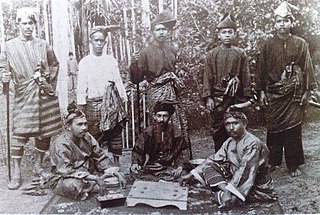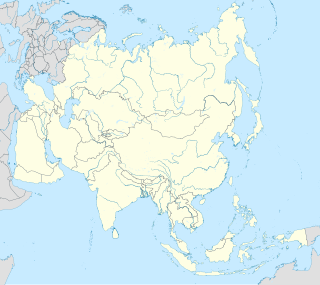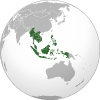
Pahang, officially Pahang Darul Makmur with the Arabic honorific Darul Makmur is a sultanate and a federal state of Malaysia. It is the third largest Malaysian state by area and ninth largest by population. The state occupies the basin of the Pahang River, and a stretch of the east coast as far south as Endau. Geographically located in the East Coast region of the Peninsular Malaysia, the state shares borders with the Malaysian states of Kelantan and Terengganu to the north, Perak, Selangor and Negeri Sembilan to the west, Johor to the south, while South China Sea is to the east. The Titiwangsa mountain range that forms a natural divider between the Peninsula's east and west coasts is spread along the north and south of the state, peaking at Mount Tahan, which is 2,187m high. Although two thirds of the state is covered by dense rain forest, its central plains are intersected by numerous rivers, and along the coast there is a 32-kilometre wide expanse of alluvial soil that includes the deltas and estuarine plains of the Kuantan, Pahang, Rompin, Endau, and Mersing rivers.

Kelantan is a state in Malaysia. The capital is Kota Bharu and royal seat is Kubang Kerian. The honorific name of the state is Darul Naim . Kelantan is located in the north-eastern corner of the peninsula. Kelantan, which is said to translate as the "Land of Lightning", is an agrarian state with green paddy fields, rustic fishing villages and casuarina-lined beaches. Kelantan is home to some of the most ancient archaeological discoveries in Malaysia, including several prehistoric aboriginal settlements.

Tun Haji Abdul Razak bin Dato' Hussein was a Malaysian politician who served as the second prime minister of Malaysia from September 1970 to his death in January 1976. He is referred to as the Father of Development.

Negeri Sembilan is a state in Malaysia which lies on the western coast of Peninsular Malaysia. It borders Selangor on the north, Pahang in the east, and Melaka and Johor to the south.

Kuantan is a city and the state capital of Pahang, Malaysia. It is located near the mouth of the Kuantan River. Kuantan is the 18th largest city in Malaysia based on 2010 population, and the largest city in the East Coast of Peninsular Malaysia.
Pekan Town is a town in Pekan District, Pahang, Malaysia. It is also the royal town of the state. Its name comes from a flower, the Bunga Pekan. Pekan is also the name of the district the town is situated in, and a parliamentary constituency in its own right. It is the home of the state's royal family headed by Al-Sultan Abdullah Ri'ayatuddin Al-Mustafa Billah Shah ibni Almarhum Sultan Haji Ahmad Shah Al-Musta'in Billah. It is also the hometown of the second Prime Minister of Malaysia, Tun Abdul Razak Hussein, and his son, former prime minister Datuk Seri Najib Razak. Najib is also Pekan's current Member of Parliament.

Jakun people or Orang Ulu / Orang Hulu are an ethnic group recognised as Orang Asli of the Malay Peninsula in Malaysia.

Temerloh is a municipality in Central Pahang, Malaysia. Temerloh has been proved to be the "centre of Peninsular Malaysia" 3TS, which is situated at Kampung Paya Siput, Lanchang. Located about 130 kilometres (81 mi) from Kuala Lumpur along the Kuantan–Kuala Lumpur trunk road, Temerloh is the second largest town in Pahang after Kuantan, the state capital. It is situated at the junction of the Pahang River and the Semantan River. Today, Temerloh usually refers to the territory under the administration of Temerloh Municipal Council which includes Mentakab, Lanchang, Kuala Krau and Kerdau.

Bahau is the principal town of Jempol District, Negeri Sembilan, Malaysia. The town's name is believed to have been derived from a Chinese phrase. Bahau's literal translation is "Horse's Mouth" while the nearby town, Mahsan means "Horse's Body" in Cantonese. Also, there's a linkage town called Tampin bordered with Malacca, locals nickname as Mahmei, means "Horse's Tail" in Cantonese.
Keris Mas, born Kamaluddin Muhamad, was a prominent Malaysian literary figure and was one of the founders of the Asas '50 literary movement. His numerous contributions to Malay language literature led him to become Malaysia's first National Laureate in 1981.

Sungai Ruan is a village located in the Raub District in the Pahang state of Malaysia. It is about 58.1 mi north of Kuala Lumpur, the country's capital, or about 12.7 km from the Raub town.

Al-Sultan Abdullah Ri'ayatuddin Al-Mustafa Billah Shah ibni Almarhum Sultan Haji Ahmad Shah Al-Musta'in Billah has reigned as the 16th Yang di-Pertuan Agong (King) of Malaysia and the 6th Sultan of Pahang since January 2019. He was proclaimed as sultan on 15 January 2019, succeeding his father, Sultan Ahmad Shah, whose abdication was decided at a Royal Council meeting on 11 January 2019.

Hanyut (Drifting) is a Malaysian adventure drama film written and directed by U-Wei Haji Saari based upon Joseph Conrad's 1895 novel, Almayer's Folly.

Syair Siti Zubaidah Perang Cina is a 19th-century syair (poem) by an unknown author. Following a gender disguised woman who conquers China to save her husband, the syair has been argued to be based on historical events.
Pahang Malay is a Malayan language spoken in the Malaysian state of Pahang. It is regarded as the dominant Malay dialect spoken along the vast riverine systems of Pahang, but co-exists with other Malay dialects traditionally spoken in the state. Along the coastline of Pahang, Terengganu Malay is spoken in a narrow strip of sometimes discontiguous fishermen villages and towns. Another dialect spoken in Tioman island is a distinct Malay variant and most closely related to Riau Archipelago Malay subdialect spoken in Natuna and Anambas islands in the South China Sea, together forming a dialect continuum between the Bornean Malay with the Mainland Peninsular/Sumatran Malay.

Terengganurians, Terengganuans or Terengganu Malays, are a Malay ethnic group native to the state of Terengganu, on the east coast of Peninsular Malaysia. Besides Terengganu, they can also be found in the neighbouring states of Pahang, Johor and their descendants can also be found in the Anambas Islands in Indonesia. As of 2010, it is estimated that the population of Terengganuan Malays are around 1.1 million people, which forms 94% of Terengganu state's population, making them the dominant ethnic group in the state.
Sri Paduka Dato' Bendahara Sri Maharaja Tun Ali ibni Almarhum Dato' Bendahara Paduka Raja Tun Koris was the 23rd and the last Bendahara of Johor Empire, and the fourth Raja Bendahara of Pahang who reigned from 1806 to 1857.

Pahang Malays are a sub-group of Malay people native to the state of Pahang, in the east coast of Peninsular Malaysia. With population of approximately 1.08 million people, they constitutes 70% of Pahang state's population, making them the dominant ethnic group in the state. Their language, Pahang Malay is one of many Malayan languages spoken in the region that belong to the Malayo-Polynesian group of Austronesian family.

Kampung Padang Balang or Padang Balang is the oldest surviving traditional village in Kuala Lumpur, Malaysia. It was circumferenced by Gombak Road, Jalan Kampung Bandar Dalam, Duta–Ulu Klang Expressway (DUKE), Kuala Lumpur Middle Ring Road 2 and Gombak River.















